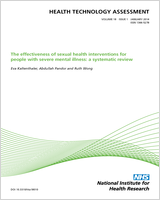Included under terms of UK Non-commercial Government License.
NCBI Bookshelf. A service of the National Library of Medicine, National Institutes of Health.
Edwards SJ, Barton S, Thurgar E, et al. Topotecan, pegylated liposomal doxorubicin hydrochloride, paclitaxel, trabectedin and gemcitabine for advanced recurrent or refractory ovarian cancer: a systematic review and economic evaluation. Southampton (UK): NIHR Journals Library; 2015 Jan. (Health Technology Assessment, No. 19.7.)

Topotecan, pegylated liposomal doxorubicin hydrochloride, paclitaxel, trabectedin and gemcitabine for advanced recurrent or refractory ovarian cancer: a systematic review and economic evaluation.
Show detailsSuggested research priorities
Provided that this was thought to be of interest to the wider clinical community, RCT evidence comparing platinum-containing regimens with non-platinum-containing regimens should be sought. Furthermore, RCT evidence of the efficacy of etoposide and best supportive care in patients with resistant/refractory disease may be desirable.
Given the palliative nature of second-line or later treatment for recurrent ovarian cancer, and the limited data available on QoL, particularly for patients with PRR disease, research to determine reliable estimates of QoL in recurrent advanced ovarian cancer might be warranted.
Future trials in recurrent ovarian cancer should endeavour to carry out analysis on patient-level data which has been adjusted for a consistent array of variables; of particular importance is the adjustment of clinical effectiveness data for PFI (measured as a continuous rather than categorical variable).
Limited information on best supportive care was identified. Some people may choose to not receive further treatment, and research into what constitutes best supportive care, and impact of best supportive care on QoL, might help to inform the decision-making process from the perspective of both the clinician and the person with advanced ovarian cancer. In addition, further research into the cost of best supportive care may also be warranted.
- Conclusions - Topotecan, pegylated liposomal doxorubicin hydrochloride, paclitax...Conclusions - Topotecan, pegylated liposomal doxorubicin hydrochloride, paclitaxel, trabectedin and gemcitabine for advanced recurrent or refractory ovarian cancer: a systematic review and economic evaluation
- General considerations for specifying the target difference - Practical help for...General considerations for specifying the target difference - Practical help for specifying the target difference in sample size calculations for RCTs: the DELTA2 five-stage study, including a workshop
- Conclusion and recommendations for further research - Initiating change locally ...Conclusion and recommendations for further research - Initiating change locally in bullying and aggression through the school environment (INCLUSIVE): a pilot randomised controlled trial
- Methods - Managing Faecal INcontinence in people with advanced dementia resident...Methods - Managing Faecal INcontinence in people with advanced dementia resident in Care Homes (FINCH) study: a realist synthesis of the evidence
- Discussion - Exercise for depression in care home residents: a randomised contro...Discussion - Exercise for depression in care home residents: a randomised controlled trial with cost-effectiveness analysis (OPERA)
Your browsing activity is empty.
Activity recording is turned off.
See more...